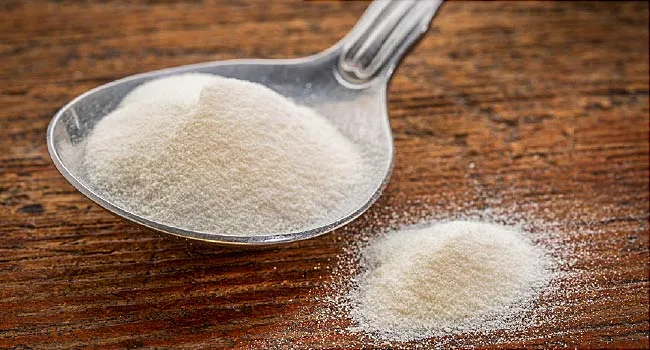
The most abundant protein in the body, collagen is a key component of skin, tendons, and ligaments. As the body ages, it makes less (and lower quality) collagen. This contributes to reduced elasticity and less fresh-looking skin.
Where do you get collagen?
Eating meat twice a week provides all the collagen most people need, says Mark Tager, MD, author of Feed Your Skin Right: Your Personalized Nutrition Plan for Radiant Beauty. Other foods can help stimulate collagen production too. “To make collagen, we require other cofactors, such as vitamin C, copper, zinc, vitamin A, and silica — all of which can be supplied by a healthy diet.”
Meanwhile, sales of collagen supplements are booming. Collagen peptides, also known as hydrolyzed collagen, are made from the bones, skin, and connective tissue of cows, pigs, and chickens, as well as from fish scales and skin. These proteins break down into amino acids in the digestive tract, which are absorbed into the bloodstream and distributed to the skin.
Unlike vitamin C, which dissipates quickly, collagen peptides remain in the skin for up to 14 days. Collagen supports moisture retention by increasing production of hyaluronic acid, which makes skin more pliable. It even fires up the body’s ability to make new skin cells — a capacity that declines with age.
“I admit I was skeptical of the hype around collagen,” says Julie Garden-Robinson, PhD, RD, a food-and-nutrition specialist at North Dakota State University. But she was swayed by a raft of studies showing its benefits. Most notably, in 2021, the International Journal of Dermatology and Venereology published a meta-analysis of 19 double-blind, randomly controlled trials on the effects of collagen supplementation on skin aging, where the majority of subjects showed improved elasticity and fewer wrinkles.
Worth noting: Collagen products that claim to be animal-free are engaging in a sleight of hand. “Collagen comes from animals,” explains Julie Greenberg, ND, AHG, a naturopathic doctor who specializes in integrative dermatology. “Vegan collagen products contain high-dose nutrients, such as vitamin C, amino acids, and silica. These are believed to help the body make more of its own collagen.” Some truly vegan collagen products made from yeasts and bacteria are in development, but they’re not available yet.
If you eat a vegetarian or vegan diet, Garden-Robinson suggests getting two servings of protein a day from a variety of sources, including nuts and beans. This gives you “ample protein to nourish your body’s needs and help maintain collagen,” she says.
And if you eat animal products and you want an extra dose of collagen, she suggests drinking a cup of bone broth.

